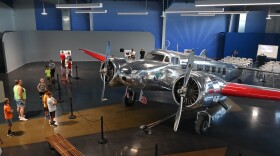-
Dozens of rare and historic Civil War battle flags stored at the Kansas Museum of History in Topeka are falling apart and in desperate need of restoration. But repairing just a single flag can cost tens of thousands of dollars.
-
Former Kansas City Star photographer Raymond Corey captured behind-the-scenes images and everyday rural life in the Midwest for decades. A new exhibition of his work highlights 50,000 negatives donated to the State Historical Society of Missouri by his family.
-
The landmark 1954 U.S. Supreme Court ruling that outlawed racial segregation in public schools may have played out differently if it hadn’t been for a tenacious group of women in Johnson County, Kansas, who led their own integration lawsuit five years earlier. The case centered around a two-room schoolhouse and included a lengthy boycott, big-shot NAACP lawyers, FBI surveillance — and six very brave children.
-
Lawrin was owned by Herbert Woolf, the president of Woolf Brothers, one of the most important clothing stores in Kansas City history. Woolf also had an odd connection to political boss Tom Pendergast.
-
Kansas City native Edward J. Dwight Jr. is set to be on the next Blue Origin rocket into space. The rare opportunity comes more than six decades after he was passed over to become a NASA astronaut.
-
Business owners have campaigned for nearly two years to sever Troost Avenue from its slaveholding past. But the effort has hit a bureaucratic roadblock, as Mayor Quinton Lucas tries to avoid another public controversy like the failed renaming of The Paseo.
-
Once seen as a musical relic, audio cassettes have survived the eras of CDs and streaming to win over music lovers of a new generation. That’s in large part thanks to the National Audio Company in Springfield, Missouri, the largest cassette manufacturer in the world.
-
Would the Chiefs and Royals really leave Kansas City if the sales tax vote fails? History says maybeRepresentatives of the Chiefs and Royals have suggested they would consider other “options” if Jackson County voters don't approve a sales tax to help fund a downtown ballpark and upgrade Arrowhead. It's not inconceivable that a professional sports team would leave Kansas City — because it's happened before.
-
If Jackson County voters feel conflicted about the April 2 stadium sales tax vote to help finance a new downtown ballpark for the Royals and Arrowhead Stadium improvements for the Chiefs, they can be confident in this: political fights over stadiums is a local tradition that goes back at least 93 years.
-
Missouri, which earned the infamous nickname of "meth capital of America," played a key role in the drug's spread across the country. A new podcast tells that story.
-
Up until a few weeks ago, Lynette Woodard from the University of Kansas had scored more points in college basketball than any woman ever. But she was never recognized by the NCAA as a scoring champion.
-
Oreo is the best-selling cookie in the world today. But few people remember the product that Nabisco blatantly ripped off: Hydrox. A creation of Kansas City’s Loose-Wiles Biscuit Company, Hydrox was billed as the “aristocrat of cookies,” with a novel combo of chocolate and cream filling. So why, more than a century later, is Hydrox still mistaken as a cheap knockoff?
-
Martin Luther King, Jr. would start 1968 — one of the most tumultuous years in American history — with an event at Kansas State University. Just months before his assassination, the speech was his last on a college campus.
-
This weekend's playoff matchup is reigniting memories of a 1971 divisional game that included two overtimes and more than 22 minutes of extra time.
-
More than three decades after Congress enacted the Native American Graves Protection and Repatriation Act, the University of Kansas announced that it still has American Indian ancestral remains, funerary and other sacred objects in its museum collections.
-
Cemeteries used to serve as parks. Can Kansas City's historic Elmwood Cemetery revive the tradition?Members of the Elmwood Cemetery Society hope the 150-year-old graveyard can once again be a place for family picnics and walks.
-
Sept. 21 marked the anniversary of when the Otoe-Missouria tribe was forced out of their lands, which would later become the city of Lincoln, Nebraska, and moved to a reservation in Oklahoma. Now the tribe hopes the day will serve as an annual reminder of reconciliation.
-
Central United Methodist Church will become a satellite for the Leawood-based Church of the Resurrection. Its history says much about Kansas City's, and it's own, past ties to slavery.
-
If you nerd out to concrete, steel and epic feats of engineering — or simply admire the bridges you cross on the way to work — read on.
-
Much of the Great Plains is way behind on moisture. The drought has drained water levels at many rivers and lakes, uncovering historical relics that are typically submerged.
-
In the 1890s, Kansas City businessmen William Nelson and August Meyer advocated for and started the Park Board. By 1895, the board had access to funding and the ability to condemn land for the purpose of establishing parks.
-
The Amelia Earhart Hangar Museum is slated to open in 2023. It honors the first woman to fly solo across the Atlantic Ocean.
-
As Kansas City’s first Black-owned housing co-op, Parade Park helped residents pursue the American Dream of owning a home and building a community. But after 60 years, it’s uncertain if it can survive foreclosure and redevelopment.
-
For generations, scientists seeking to learn about prehistoric ocean life have flocked to a place that’s about as far from the ocean as you can get — dry, dusty western Kansas. What they’re finding could teach us both about life in the ancient world and about the future of life in a changing climate.



























